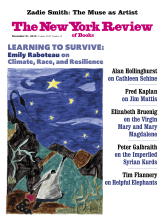In response to:
Egypt: Between Order and Chaos from the October 10, 2019 issue
To the Editors:
I appreciated Ursula Lindsey’s thoughtful review of my book about Egypt, The Buried [NYR, October 10], but I would like to make some clarifications. Lindsey refers to a controversy that erupted among some English-reading Egyptians and expats over my New Yorker profile of Sayyid, a garbage collector in my Cairo neighborhood. Some of these readers seemed to think that, in the academic tradition of anthropology, Sayyid should have been kept anonymous. But this is not standard practice in journalism. Sayyid was not involved in any political activities that would have put him at risk, and he agreed to be named. He is illiterate, but he spoke frequently on the phone with an Arabic-speaking fact-checker, who confirmed every detail in the article ahead of publication. In a society that effectively anonymizes people like Sayyid, I believed that there was value in portraying him as a real individual with a name and a face.
Lindsey mentions that Sayyid had shared “highly personal information” about the garbage thrown away by people on his route, but these individuals’ names were not used. For potentially embarrassing details, like the pornography and sex pills that had been discarded by one resident, or a priest who had underpaid Sayyid, I chose individuals who were both unnamed and also either dead or no longer living on Sayyid’s route. There was never an instance of a resident feeling exposed and confronting Sayyid or me.
Despite Sayyid’s lack of formal education, he is highly intelligent, observant, and resourceful. He provides other important neighborhood services, like returning lost items and alerting residents if anything seems amiss. I was confident that readers would admire these qualities, and this was by far the most common reaction. Sayyid himself was not upset by the article, which was translated and read to him aloud. He agreed to allow me to follow him for another two years as part of my book research. We are still in frequent contact by phone. Given that Sayyid had no complaint, the outrage that some readers expressed on his behalf seemed excessive, as well as a form of elitism.
After the story was published, a small but vocal group of angry readers began posting messages on a Facebook site managed by my sister in the United States. When some people mentioned the possibility of sending threatening items or messages to my family’s home in Cairo, we decided to disable the comments section. I posted an explanation of the article’s methodology, and in this message I also made a dismissive remark about charges of Orientalism. Lindsey describes my comments as “disingenuous,” and while I agree that these views were presented incompletely, it’s important to understand the context. This was a small part of a larger response focused on research issues, and my point was that as a writer I have tried to give individuals agency by telling their stories accurately and sympathetically, regardless of their status or educational level. And I felt pressured to make this statement quickly. In Egypt, it was not unusual for a journalist to receive threats, and I have seen public comments even by supposedly liberal individuals who expressed a hope that I and other Western journalists would get arrested by the Egyptian authorities. I do not use Facebook, Twitter, or any social media in part because of the ways in which these platforms can be used to bully a writer.
I am grateful to have been of a generation that was educated in the wake of Edward Said’s Orientalism, which helped inspire more respectful ways of approaching subjects in the developing world. I started my overseas career as a Peace Corps volunteer in China, and in both China and Egypt I studied the languages seriously and committed myself to long residences (five years in Egypt, eleven and counting in China). I have always made a point of researching outside of national capitals and major cities. In both countries, I focused primarily on longitudinal research, spending years following subjects who were neither famous nor politically significant. This background is far more revealing than any pressured remark on a Facebook page.
I do believe, though, that the label of Orientalism is sometimes used in ways that have nothing to do with Edward Said or his thinking. It can be a one-word epithet that dismisses the work of any Westerner, regardless of that individual’s history and research practices. In Egypt, whenever I wrote critically about certain topics—gender disparity, patriarchal structures, attitudes toward sex, even violent homophobia—there were inevitable charges that I was imposing Western values in some colonial fashion. But in truth my viewpoint was shaped much more by my time in Reform-era China, where I observed people in a deeply traditional society rethinking their attitudes toward such issues. I believe that it’s a mistake to dismiss such experience out of hand. In every society, it’s important to have observers coming from all directions, just as it’s important to have local viewpoints.
Peter Hessler
Chengdu, China
This Issue
November 21, 2019
The Defeat of General Mattis
The Muse at Her Easel
Lessons in Survival



